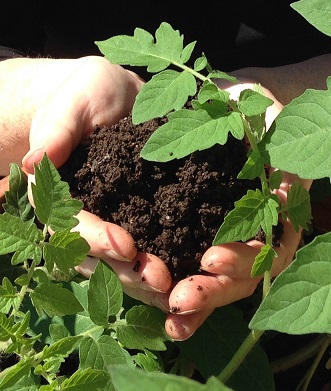A conversation between Annie and her grandfather
Grandpa scooped out a handful of moist black material that looked an awful lot like dirt and manure mixed together. “Isn’t this the most beautiful vermicompost you’ve ever seen? Black and rich, with an earthy smell, made from the best that worms have to offer.”
Annie wrinkled her nose. “Yuck.”
“Why yuck? This is good stuff. Like I was telling you last night…”
“I know, Grandpa. ‘ Vermicompost, vermicast, vermiculture, vermitea …’ But why should we even care? It’s just a bunch of stinky worm poop.”
Grandpa smiled. “You’re right – when you break it down, it all begins with worm poop, but as to where it ends up? That’s the miracle of the worm.”
Annie held out a big fat earthworm in her hand. “Here’s a worm for your vermicompost, Grandpa.”
“Ohh, he’s a fat one, isn’t he? But I’m afraid I can’t use him. He’s the kind of earthworm that burrows way deep in the ground, several feet down. The kind of worms we use in vermicomposting are surface feeders, and in the wide world of worms only a few species that do that.”
Annie dropped the worm. “Vermi-this and vermi-that… Everything’s vermy around here.”
“Vermi-squirmy. Well, the root of the word ‘verm’ means ‘worm’ in Latin. That’s where we get all the vermy-words. For example:
- “Vermiculture is the growth and maintenance of earthworm cultures over a period of time. When you buy a cup of worms at the bait store and take them home to raise more worms, you’re practicing vermiculture;
- “Vermicompost is what you get when you use certain kinds of earthworms to create a mix of plant waste, bedding and vermicast…”
- “Then what’s vermicast and vermitea?” asked Annie.
- “Vermicast is just a nice way of saying worm poop. And…
- “Vermitea …. Hmm, another word for ‘vermitea’ is compost tea that you make by brewing vermicompost in aerated water for about a day or so. Unless you brew it for a real short time, then it’s called vermiextract.”
- Annie wrinkled up her nose. “I thought vermitea was the liquid that came out of the bottom of the worm bin.”
- Grandpa held up a finger.
- “No, that’s leachate. A lot of folks call it vermitea or worm tea but it’s actually leachate. It’s a tricky substance since, being liquid that’s leached through the bin, it may have pathogens and bad bacteria in it. Vermitea and vermiextract is safer, having been processed by the worms.”
“Worms drink that??”
Grandpa laughed. “Oh no, the plants drink that. Just like you put fertilizer in water to spray your plants with, you do the same with vermitea.”
“Then why not forget about all this vermi-stuff and just use fertilizer? Sounds a whole lot easier. ”
“Because vermicompost is like a fertilizer that feeds the soil, makes it healthy. The more vermicompost you use over time, the more water your soil can hold. Plus, vermicompost is full of microbes and nutrients that build your soil into the very best soil it can be. It’s no harder to feed your soil vermicompost than to feed it chemical fertilizer. You use it in solid form before you plant, and you use it as a tea or an extract after you plant. Either way, the soil loves it, beneficial insects love it, and your plants love it. And it’s safe.”




